
Eleusine indica, the Indian goosegrass, yard-grass, goosegrass, wiregrass, or crowfootgrass, is a species of grass in the family Poaceae. It is a small annual grass distributed throughout the warmer areas of the world to about 50 degrees latitude. It is an invasive species in some areas.
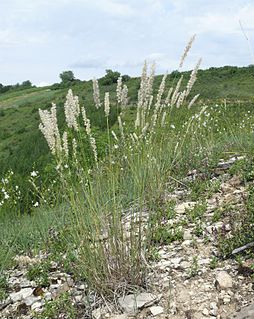
Melica is a genus of perennial grasses known generally as melic or melic grass. They are found in most temperate regions of the world.

Glyceria is a widespread genus of grass family common across Eurasia, Australia, North Africa, and the Americas.

Aira praecox is a species of grass known by several common names, including early hair-grass, yellow hairgrass and spike hairgrass. It is native to Europe, where it is found in dry, sandy places, on rocky outcrops, and in heath grassland. It also grows in North America as an introduced species, where it can be found on the east and west coasts in sandy or rocky areas, such as beaches and roadsides. This is a tuft-forming annual grass growing up to about 25 centimeters in maximum height. The thin, narrow leaves are located at the base of the stem, and are typically 0.3–2 millimeters wide. It bears very small inflorescences of purple-tinted green bisexual spikelets.
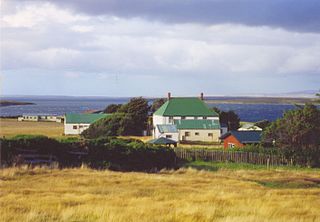
Tussock grasses or bunch grasses are a group of grass species in the family Poaceae. They usually grow as singular plants in clumps, tufts, hummocks, or bunches, rather than forming a sod or lawn, in meadows, grasslands, and prairies. As perennial plants, most species live more than one season. Tussock grasses are often found as forage in pastures and ornamental grasses in gardens.
Antennaria geyeri is a North American species of flowering plant in the family Asteraceae known by the common name pinewoods pussytoes or mountain pussytoes. It is native to the western United States where it grows in woodland and scrub very often on the forest floor under pine trees. It is found in Washington, Oregon, northern California, and northwestern Nevada.
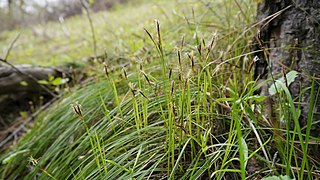
Carex geyeri is a species of sedge known by the common names Geyer's sedge and elk sedge. It is native to western North America from British Columbia to California to Colorado, where it grows in dry areas in mountain meadows, grasslands, and open forest. This sedge produces scattered tufts of stems connected by a network of long rhizomes. The stems are triangular in cross-section and approach half a meter in maximum height. The inflorescence is composed of a cluster of staminate flowers and a cluster of pistillate flowers separated by a node.

Melica aristata is a species of grass known by the common names awned melic and bearded melicgrass.

Melica bulbosa is a species of grass known by the common name oniongrass. The common name comes from the onionlike appearance of the corm at its root; it is not related to the onions. It is native to western North America from British Columbia to the Rocky Mountains to California. It may or may not occur as far east as Texas.

Melica californica is a species of grass known by the common name California melic.

Melica fugax is a species of grass known by the common names little oniongrass and little melic. It is native to western North America where it usually grows in volcanic soils in forest and plateau habitat from British Columbia to the Sierra Nevada and North California Coast Ranges in California.

Melica harfordii is a species of grass known by the common name Harford's oniongrass.

Melica imperfecta is a species of grass known by the common name smallflower melic and little California melic.

Melica spectabilis is a species of grass known by the common names purple oniongrass and showy oniongrass.
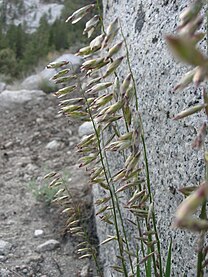
Melica stricta is a species of grass known by the common name rock melic.

Melica subulata is a species of grass known by the common name Alaska oniongrass.

Melica torreyana is a species of grass known by the common name Torrey's melicgrass.

Tripidium ravennae, synonym Saccharum ravennae, with the common names ravennagrass and elephant grass, is a species of grass in the genus Tripidium. It is native to southern Europe, western Asia and South Asia and is known in North America as an introduced species, where it is sometimes an invasive and troublesome noxious weed.
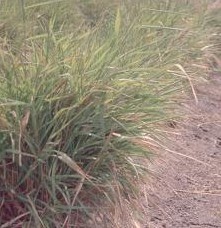
Melica nitens is a species of grass known by the common names threeflower melicgrass or three-flowered melic. It is native to the central United States.
This page is based on this
Wikipedia article Text is available under the
CC BY-SA 4.0 license; additional terms may apply.
Images, videos and audio are available under their respective licenses.


















